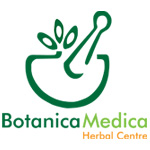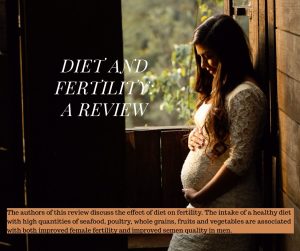* * * DIET AND FERTILITY: A REVIEW * * *
TAKE-HOME MESSAGE
* The authors of this review discuss the effect of diet on fertility. The intake of a healthy diet with high quantities of seafood, poultry, whole grains, fruits, and vegetables are associated with both improved female fertility and improved semen quality in men. High-quality studies are also beginning to cast doubt on the proposed harmful effects of moderate alcohol and caffeine intake on fertility.
* While progress has been made in understanding the relationship between fertility and diet, there are still large gaps in current knowledge. The male and female diets should be considered together, and further randomized trials are needed to confirm current findings.
The literature on the relation between diet and human fertility has greatly expanded over the last decade resulting in the identification of a few clear patterns. Intake of supplemental folic acid, particularly at doses higher than those recommended for the prevention of neural tube defects, has been consistently related to lower frequency of infertility, lower risk of pregnancy loss and greater success in infertility treatment. On the other hand, and despite promising evidence from animal models, vitamin D does not appear to exert an important role in human fertility in the absence of deficiency. Antioxidant supplementation does not appear to offer any benefits to women undergoing infertility treatment, but it appears to be beneficial when it is the male partner who is supplemented. However, the available evidence does not allow discerning which specific antioxidants, nor at which doses, are responsible for this benefit. Long chain omega 3 fatty acids appear to improve female fertility although it remains unclear to what extent contamination of shared food sources, such as fish with high levels of environmental toxicants, can dampen this benefit. Last, adherence to healthy diets favoring seafood, poultry, whole grains, fruits and vegetables, are related to better fertility in women and better semen quality in men. The cumulative evidence has also piled against popular hypotheses. Dairy and soy, once proposed as reproductive toxicants, have not been consistently related to poor fertility. In fact, soy and soy supplements appear to exert a beneficial effect among women undergoing infertility treatment. Similarly, as data from large, high-quality studies continues to accumulate, the evidence of a potentially deleterious effect of moderate alcohol and caffeine intake on the ability to become pregnant seems less solid than it once did. While a complete picture of the role of nutrition on fertility is far from complete, much progress has been made. The most salient gaps in the current evidence include jointly considering female and male diets, and testing the most consistent findings in randomized trials.
At Botanica Medica our Naturopaths are well aware of the importance of a good diet and the effect it can have on fertility. They come across lots of interesting studies and are always updating their knowledge. If you would like to make an appointment with one of our Naturopaths call Botanica Medica on 8271-1827 today. They are only to happy to share the knowledge they have gained through their studies and patient outcomes. Botanica Medica is located at 97 Glen Osmond Road, Eastwood and appointments are available Monday to Saturday including some after hours.
Published in Primary Care
Journal Scan / Review · September 05, 2017
Diet and Fertility: A Review
American Journal of Obstetrics and Gynecology
Audrey J. Gaskins, ScD, Jorge E. Chavarro, MD, ScD


Recent Comments